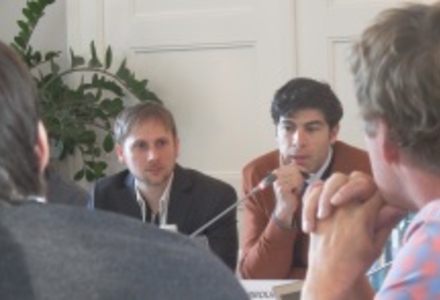Strengthening assessments to support SDGs
An expert workshop at MCC aimed to improve environmental policy assessments to inform about the implementation of SDGs.

[Translate to EN:] Martin Kowarsch (l.), Jason Jabbour (r.), Foto: MCC
02.10.2015
The Sustainable Development Goals (SDGs) – a set of 17 global goals to promote sustainability and to end poverty in all its forms by 2030 – were only recently adopted by the United Nations in New York. Among them is SDG 13 (climate mitigation and adaptation) as well as SDG 1 (ending poverty), SDG 2 (achieving food security and sustainable agriculture) and SDG 15 (protecting biodiversity, forests and other ecosystems).
However, in order to achieve ambitious CO2 emissions reductions, a future global energy mix might include a large proportion of bioenergy. This could affect food prices, land use including deforestation, and land rent dynamics worldwide. Such co-effects strongly interlink the SDGs with each other. Consequently, the various interdependencies, synergies and trade-offs on different governance levels between different SDGs require a thorough understanding of the possible means of implementing the SDGs – and particularly of the poorly understood positive and negative practical implications of these means.
These interdependencies raise questions: How to realize and implement this broad and very ambitious set of goals? What are reasonable measures and policy instruments? Those questions could be addressed by contemporary, solution-oriented Global Environmental Assessments (GEA). Besides their prospects, these GEAs face several substantial challenges.
Exploring both the opportunities and challenges of such GEAs was the aim of the workshop “GEAs at crossroads: Lessons learned, emerging challenges, and future options” organized and hosted by the Mercator Research Institute on Global Commons and Climate Change (MCC). It was attended by senior assessment practitioners, policy representatives and distinguished scholars. This timely high-level expert workshop was part of the MCC-UNEP research project on the “future of global environmental assessment making” (FOGEAM). A high-ranking, peer-reviewed publication of the papers presented at this expert workshop is envisaged.
“The policy contexts for GEAs are changing,” says Martin Kowarsch, organizer of the workshop and head of MCC Working Group Scientific Assessments, Ethics and Public Policy. “While earlier GEAs primarily highlighted environmental degradation as such, they should now also provide sound social-science analysis of alternative policy options and implications.”





